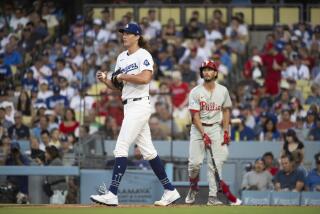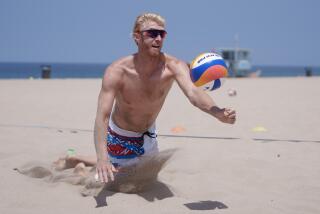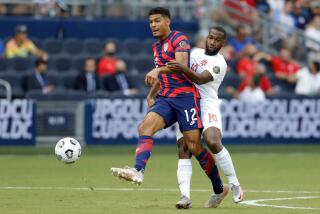The Countdown: 26 Days to the Games : Cuba’s Hottest Topic : As Usual, It’s Baseball, as in, Why Are They Tinkering With the Olympic Team?
- Share via
It’s barely 10 a.m., but already a blistering sun has turned Havana’s Parque Central into a sauna. While more prudent Cubans quickly seek refuge in the Hotel Inglaterra, the 160-year-old Garcia Lorca theater or other nearby buildings, a group of 70 or 80 men gathers beneath the white marble gaze of independence leader Jose Marti, challenging both the weather and convention to openly discuss the pressing issues of the day.
For the past two years a frequent topic of debate at la esquina caliente--or the hot corner, a name drawn from the fervor of the conversation, not the heat of the sun--has been the declining quality of Cuban leadership.
“Why, in the old days,” the men bitterly complain, “the U.S. couldn’t have pushed us around the way they’ve done lately.”
“The guy in charge,” someone will eventually surmise, “just hasn’t got it anymore.”
The target of the criticism is not President Fidel Castro; after all, he’s only a politician. Instead, the men who gather on the park benches and beneath the tropical trees in Old Havana take aim at someone who is arguably more important to average Cubans--Jorge Fuentes, manager of the country’s national baseball team.
In his 10th season with la seleccion nacional, Fuentes, 46, has lost only one tournament game--to the United States in the first round of the Pan American Games in 1987, his first year as manager. Since then, he has guided Cuba to 134 consecutive victories in international play, winning five Intercontinental Cups, three Pan Am titles, three world championships and one Olympic gold medal in the process. Such success has spoiled Cuban fans, however, and winning is no longer enough; now Fuentes’ team must dominate the competition. In winning the 1994 world championship in Nicaragua, for example, Cuba steamrollered its opposition by an average score of 12-1, yet Cuban sportswriters said their offices were besieged with calls from fans upset by the team’s play.
“I think sometimes the coaches are under more pressure than the players,” says Gus Dominguez, a Havana-born player representative who has helped nearly a dozen Cuban defectors sign professional baseball contracts in the past four years. “I feel for them because they have to win. In Cuba, you have to have a winning game or you don’t get to coach the next one.”
That fate nearly befell Fuentes last summer when Team USA swept a four-game series from Cuba in Millington, Tenn. Because the series was not part of an international tournament, Fuentes’ eight-year winning streak remained intact. Yet that was small consolation to the man who had just become the first Cuban manager to lose a series of any kind in four decades.
As a result of that performance--as well as lackluster efforts in August’s Olympic qualifying tournament in Edmonton and the Intercontinental Cup in Havana last fall--the Cubans spent the last eight months rebuilding their Big Red Machine. No less than eight of the 22 players on the Olympic squad have been added to the national team since last summer, a remarkably quick makeover for a program that prefers to operate in four-year cycles.
Among the missing is colorful outfielder Victor Mesa, 36, a 15-year veteran of the national team; designated hitter Lourdes Gurriel, 39, a 17-year veteran and the most valuable player in the last world championships; right-handed pitcher Orlando “Duke” Hernandez; shortstop German Mesa; and first baseman Luis Toca.
The dismissals of Victor Mesa and Gurriel were no surprise; both had planned to leave the national team after the Atlanta Games anyway, so last season’s collapse simply accelerated that schedule. But politics--as it so often does in Cuba--may have influenced the unexpected decision to cut the other three.
Hernandez, 29, a six-year veteran, was the No. 2 starter on an otherwise inexperienced staff. But he is also the brother of Livan Hernandez, who defected from the Cuban national team last September to sign a $4.5-million contract with the Florida Marlins. Although the Cubans say Hernandez hurt his elbow and is unable to pitch, there is widespread speculation he was left home because officials feared another defection.
Similar fears were also raised about German Mesa, 29, and Toca, 25, although their absence from the national team was officially blamed on poor performances in Cuba’s national tournament last winter.
Mesa, perhaps the top amateur player at his position in the world, will certainly be missed in Atlanta. A clutch hitter with surprising power, he’s such a smooth fielder that New York Met shortstop Rey Ordonez, believing he would never replace Mesa on Cuba’s national team, chose to defect three years ago rather than languish as a backup. His spot in Atlanta will be taken by Eduardo Paret, 23, who is already being touted as Cuba’s next superstar. Toca’s spot will be filled by veteran Orestes Kindelan.
Not surprisingly, the demotions have drawn criticism at home.
“They got rid of a lot of the older players and replaced them with young guys who may not do well in a crunch,” says Rafael Guerrero, an agronomist who works with farmers outside Santiago in eastern Cuba.
Though continuity and experience have always been Cuban baseball’s greatest assets, the quick infusion of new blood only weeks before the Olympics may actually make the team stronger.
“It’s given a new dimension to the team,” says Dominguez, who recently saw the Cubans work out in Mexico. “I think it’s about time they made some changes. I think you’ll see a better team now.”
*
Baseball is not the only sport in which Cuba will contend for a gold medal in Atlanta. In track and field, world-record holder Javier Sotomayor (high jump) and world champion Ana Quirot (women’s 800 meters) are solid favorites in their specialties. Long jumper Ivan Pedrosa underwent surgery March 26 for a severe hamstring tear but may still make it to Atlanta. If he does, he gives Cuba another medal contender.
Backstroke specialist Rodolfo Falcon or breaststroker Mario Gonzales could become the island’s first Olympic swimming champion. Cuba will also field medal threats in men’s and women’s volleyball, women’s basketball and wrestling.
There’s no doubt the Cuban anthem will be played in the boxing venue; the only question is how many times. Led by heavyweight Felix Savon, the defending Olympic champion and the most dominant amateur fighter of the decade, this year’s boxing team may be better than the one the Cubans took to Barcelona, where they won seven golds and two silvers in 12 weight divisions.
Overall, Cuba won 31 medals--14 gold--in 1992 to finish fifth in the medal count. On a per-capita basis--Cuba has a population of 10.8 million, less than Los Angeles and Orange counties combined--it was one of the greatest performances in Olympic history. Before the Cuban revolution in 1959, Cuba had won only three medals in the previous 11 Olympics; since then, the island has won 77 medals in seven Games.
Paradoxically, the success of Cuba’s sports program owes much to the island’s size and limited resources. Unlike the massive athletic regimes of East Germany and the former Soviet Union, upon which it was based, Cuba’s National Institute of Sports, Education and Recreation (INDER) does not have the luxury of ignoring any child who shows even the slightest aptitude for sports.
“Because Cuba is so small, there has been more of an attempt to worry about each individual athlete. Through the organization of the sports system, they make sure they see everybody who’s got talent,” says Paula J. Pettavino, a professor of political science at American University and co-author of “Sport in Cuba.”
Such a painstaking approach--”like polishing a diamond in the rough,” according to one Cuban official--has produced enormous rewards. The sprinting speed of two-time Olympic track champion and former world-record holder Alberto Juantorena, for example, was discovered on the basketball courts. Heavyweight boxer Teofilo Stevenson, winner of three Olympic golds, was found on the baseball field.
“To me, this points to the individual attention they get,” Pettavino says.
The hard economic times that followed the collapse of the Soviet Union forced INDER to seek new sources of revenue to stay afloat. As a result, Cuba has begun “renting” athletes and coaches to dozens of countries and pouring the proceeds back into its development programs. Last year, about 500 Cuban coaches and trainers were working in 38 countries while a much smaller number of athletes were playing abroad under agreements that called for 70% or more of their earnings to be paid directly to the Cuban government. In 1994, according to a government press release, INDER earned $5 million from the contracting of coaches alone.
Even so, it has been a struggle to keep the sports program alive. And as rationing grows stricter and basic goods grow scarcer, it will become harder for the government to justify its lavish support of sports. But should these Games mark Cuba’s last hurrah as an Olympic powerhouse, it’s difficult to imagine a more fitting site than Atlanta.
“I think U.S. policy has had a lot to do [with Cuba’s sporting success], the fact that they are dumped on so much by the United States,” Pettavino said. “It’s produced this siege mentality. So in Atlanta, I think they’ll be doubly motivated.”
More to Read
Go beyond the scoreboard
Get the latest on L.A.'s teams in the daily Sports Report newsletter.
You may occasionally receive promotional content from the Los Angeles Times.







